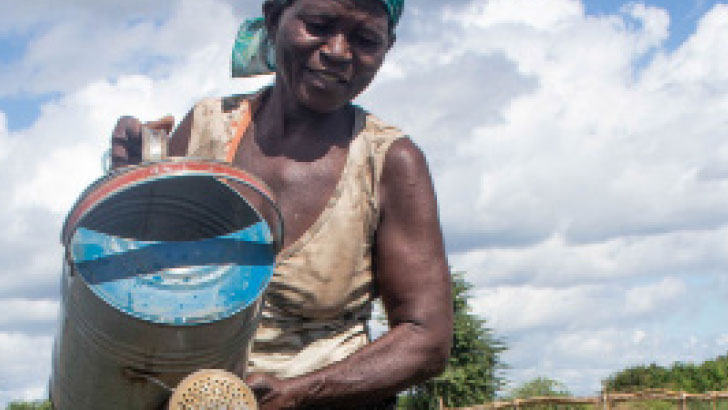Building back better after Idai
Anne Moyo from Mwanaboya Village in Nsanje escaped the rage of Cyclone Idai and the floods that followed.
Without her participation in the World Food Programme (WFP)-supported Tapulumuka small-scale irrigation scheme, the 74-year-old woman joined hundreds of affected people in her area that sought food assistance.
“Before the floods happened, I grew onions. I sold them and got over K200 000 with which I bought iron sheets. I plan to build a decent house soon,” says Moyo, who has been living in a makeshift shelter since floods washed away her house in 2015.

She explains: “I grow maize, onions and green vegetables on one piece of land which is safe from flooding. I produce enough to feed my children and sell the surplus to buy other things.”
As Malawi is prone to disasters, WFP has been working to equip families such as Moyo’s to resist shocks like floods and drought.
Thanks to the irrigation system and other floods mitigation structures, thousands of families supported by WFP were able to withstand the effects of Cyclone Idai.
It has been five months since floods hit hard 800 000 people in Malawi, killing 60 people, displacing 90 000 families and destroying livelihoods.
Displaced people were hosted in tents at evacuation camps and WFP provided humanitarian support to 430 000 people in need.
Ruth Lazo, a 36-year-old widow and mother of five who lived in one tented evacuation camp in Chikwawa with another 1 000 displaced people, is one of them.
She recalls: “At the time of floods, I was eight-months pregnant and very weak. My house collapsed and my maize field was washed away. I moved from my village, four kilometres away, to this camp for safety.”
A few weeks later, she delivered a baby girl, named Aluva, in a nearby clinic.
“People at the camp were supportive to my family. We lived like a family,” she says.
Ruth has now returned home where she is being supported to rebuild her destroyed house and livelihood.
Since she was in the camp, Ruth and her children received cash to buy food in the local markets.
This was good for the local economy and allowed people to buy the food they preferred. Thanks to the support of our donors, 430 000 affected individuals received K18 000 each month to buy food.
Families with pregnant and breastfeeding women like Ruth received an additional top-up so they could afford nutritious foodstuffs.
WFP, the United Nations food agency, received the generous support of various donors to quickly roll out food and cash distributions in the most affected of all 28 districts of Malawi.
Following the cyclone, WFP assisted over 430 000 people in disaster zones with emergency food and cash assistance.
In 2019, WFP assisted 20 000 families to rebuild damaged infrastructures and livelihoods. Beneficiaries receive food or cash to meet their immediate needs while they work in their communities for the clearing of debris and repair of damaged roads, among others.





